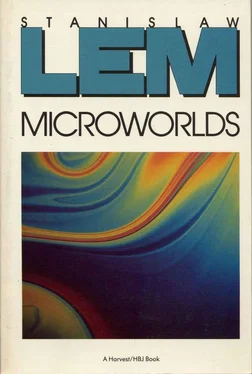The scientific bibliography of the theory of “robots” forms a thick volume; there exists a world-renowned organization of astrophysicists (CETI) concerned with searching for signals emitted by Todorov’s “supernatural beings,” i.e., by extraterrestrial creatures; for our theoretician even the “interplanetary background” possesses supernatural properties. Let us, however, regard all these qualifications as slips of the pen. We may as well do so, since Todorov’s theory would be fine if it contained only such defects.
As we know, Todorov calls the fantastic a transitional boundary state on an axis whose opposite extremes signify the rational system of nature and the irrational order of marvels. For a work to manifest its fantastic character, it must be read literally, from the standpoint of naïve realism, thus neither poetically nor allegorically. These two categories, according to Todorov, exclude one another with logical necessity, hence fantastic poetry or fantastic allegory is always impossible. This second categorical axis is perpendicular to the first. Let us clarify these relationships on a “microexample” of our own, given by a single simple sentence. The sentence “A black cloud swallowed the sun” can be taken, first of all, as a poetic metaphor (a thoroughly trite one, but that is beside the point). The cloud, we know, was only figuratively compared to a being capable of devouring the sun, since in fact it merely hid it from view.
Furthermore, it is possible, by dint of contextual suggestions, to substitute for the cloud, say, falsehood, and for the sun, truth. The sentence becomes an allegory: it says that falsehood may obscure truth. Again, this is a platitude, but the relations that hold are clearly apparent, and that is what we are after.
Now if instead we take the sentence literally, some uncertainties emerge that make it possible for indecision and, by the same token, the fantastic to result. The cloud, we know, “actually swallowed the sun” — but in what order of events, the natural or the marvelous? If it gulped it down as a fairy-tale dragon might, then we find ourselves in a fairy tale, in the “pure marvelous.” But if it engulfed the sun as did a certain cosmic cloud in the novel The Black Cloud by the astrophysicist Fred Hoyle, we shift to science fiction. In this novel the cloud is made of cosmic dust, it is a “cybernetic organism” and it engulfed the sun because it feeds on stellar radiation. The explanation acquires rationality as a hypothetical extrapolation from such disciplines as the theory of self-organizing systems, the theory of evolution, etc.
To be sure, the results of our classification do not coincide with Todorov’s, since for him science fiction is irrationalism embodied in pseudoscience. There is no point to arguing about Hoyle’s Black Cloud. It is enough to note that science fiction is nourished by scientific revelations — e.g., in the aftermath of the heart transplants there appeared swarms of fictional works that described criminal gangs snatching hearts from the breasts of young people on behalf of rich oldsters. Even if this is improbable, it assuredly does not belong to any supernatural order of things. But after all, arbitration might reconcile the conflicting viewpoints by effecting, say, within the scope of Todorov’s axis, a translation of some titles, at least, toward the pole of the Rational.
Things get worse when it comes to subgenres of the fantastic for which there is no place at all on Todorov’s axis. To what genre should Borges’s “Three Versions of Judas” be assigned? In this work Borges invented the fictional heresy of a Scandinavian theologian, according to which Judas, not Jesus, was the true Redeemer. This is not a “marvelous” tale — no more than any genuine heresy such as the Manichaean or the Pelagian. It is not an apocryphon, for an apocryphon pretends to be an authentic original, while Borges’s text does not try to conceal its literary nature. It is not an allegory, nor is it poetry, but, since nobody ever proclaimed such an apostasy, the matter cannot be placed in the order of real events. Quite obviously we have to do here with an imaginary heresy, that is, with fantastic theology.
Let us generalize this interesting case. Let us recognize unprovable propositions, such as metaphysical, religious, or ontological assertions, as forming an “actual religious credo,” a confession of faith, the affirmation of a world view, if they have entered in just this guise into the repository of the historic civilizations. From an immanent standpoint it cannot be discerned from any such proposition, whether it was uttered with the conviction that things are really as it claims, or whether it was enunciated nonseriously (in “ludic” fashion, thus nonassertively). If no philosopher named Schopenhauer had ever existed and if Borges had invented in a story a doctrine called “The World as Will,” we would accept this as a bit of fiction, not of the history of philosophy. But of what kind of fiction, indeed? Of fantastic philosophy, because it was published nonassertively. Here is a literature of imaginary ideas, of fictional basic values, of other civilizations — in a word, the fantasy of the “abstract.”
On Todorov’s axis there is likewise no place for fantastic history, which did not happen but might have. This is a matter of so-called political fiction, telling what might have been if Japan rather than the United States had fabricated the atomic bomb, if the Germans had won the Second World War, and the like. These are not uncanny tales — at any rate, no more so than what has actually happened in the present century — and they are not marvelous, since it would hardly have taken a miracle to make Japanese physicists go to work building reactors, and also there is no question of the reader’s being unsure about whether the narrated events are rational or irrational. And yet in just this way objective worlds are constructed, the nonexistence of which in past, present, or future is an irrefragable certainty. So what sort of books are these? Beyond a doubt, ones that fabricate a fantastic universal history.
Thus our Procrustes has not made place on his meager axis even for actually existing varieties of the fantastic — let alone “theoretically possible” kinds, for which there is a fortiori no room in his bed of torture.
Let us now take a closer look at Todorov’s axis. It is of logical ancestry. The structuralist is indebted to the linguists, and they in turn adopted this simplest structure of exclusion from set theory, in that here the principle of the excluded middle holds: an element either belongs to a set or it does not, and forty-five percent membership in a set is impossible. Todorov ascribes to this axis a fundamental, because definitional, significance on the highest level of abstraction. However, the essential thing is not the axis but the reader’s act of decision. Reading a literary work indeed calls for decisions -in fact, not just one, but an ordered set of them, which result in the genre classification of the text. The reader’s decisions do not oscillate in only one dimension. Assuming as a working hypothesis that these are always decisions with respect to simple (binary) alternatives, thus dichotomous, one can enumerate such additional axes as:
(a)
Earnestness : irony. Irony is calling a statement in question, either its linguistic level (this has been done stylistically by Gombrowicz) or its objective level. As a rule irony is in some measure reflexive. But lest the “deflation” of the utterance should become self-destruction on its part, this tactic stabilizes the reader’s hesitancy, or renders futile the attempt at a definitive diagnosis with respect to the designated opposition. It achieves its optimum durability when the separation of an “ironic component” from a “serious component” in the text is not feasible. “Three Versions of Judas” is of just this kind.
Читать дальше












